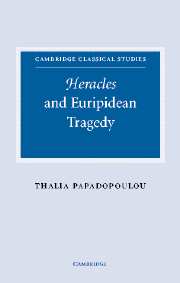Introduction: Heracles in perspective
Published online by Cambridge University Press: 22 September 2009
Summary
This is a study of Euripides' Heracles, a play which has given rise to a wide range of responses on the part of the critics, from condemnation to admiration. In some ways, of course, the tradition of interpretation of a particular play stays consistent over a long period, because all commentators and critics use previous readings, but their manner of reading is also informed by changes in their cultural environment. At the same time, the study of tragedy, set against the larger framework of the humanities, is continuously enriched by trends in literary criticism. The underestimated subtlety and the critical history of the play justify writing a whole book on Heracles. To begin with, this is a play of great significance in examinations of other Euripidean dramas, especially in discussions of themes such as heroic ethics, madness and the role of the gods. But, above all, it is a drama which deserves a full and fresh treatment in its own right because it represents some of Euripides' most spectacular writing, in terms of emotional and intellectual effect, structure, narrative, rhetoric, stagecraft and audience reception.
Most studies during the nineteenth and twentieth centuries focused on the unity of the play, either questioning or defending it. Wilamowitz devoted his imposing study of Greek tragedy to this particular play, and his approach proved to be influential for at least a couple of generations.
- Type
- Chapter
- Information
- Heracles and Euripidean Tragedy , pp. 1 - 8Publisher: Cambridge University PressPrint publication year: 2005

